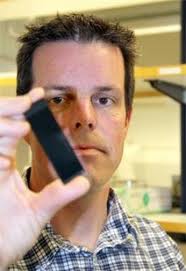08:00 | Registration |
|
Advances in Protein and Antibody Arrays |
| |
08:30 |  | Keynote Presentation Analysis of Signaling Networks in Human Tumours
Markus Templin, Head, University of Tuebingen, Germany
|
|
09:30 | Antibody-centric Profiling of Plasma Proteins in Disease Biobanks
Jochen Schwenk, Director- Plasma Profiling Facility, KTH Royal Institute of Technology, Sweden
Applications of bead-based affinity arrays will be presented from various larger scaled efforts within plasma biomarker discovery and verification. |
10:15 | Coffee and Networking in Exhibiton Hall |
10:45 | High Throughput Unbiased Proteomics and Healthcare
Larry Gold, Chief Executive Officer/Chairman, SomaLogic, United States of America
Using special affinity reagents – a new class of aptamers called “SOMAmers” – we have built a broad human proteomic array. We measure quantify human proteins (in blood, tissues, or other matrices) with high accuracy and sensitivity. The data provide biomarker discovery for a broad set of diseases and conditions, including cardiology, oncology, autoimmune diseases, rare diseases, and nutrition. |
11:30 | Use of Reverse Phase Protein Arrays to Elucidate Impact of Targeted Drugs on Signaling Networks
Ulrike Korf, Senior Scientist/Group Leader, German Cancer Research Center, Germany
Analyzing signaling network dynamics upon exposure to targeted drugs might allow insights into drug response and resistance mechanisms. Using reverse phase protein microarrays (RPPA) as experimental platform, quantitative proteomic data were generated by exposing human breast cancer cell lines to targeted drugs such as trastuzumab. |
12:15 | Lunch and Networking in Exhibition Hall |
12:45 | Poster Viewing Session |
13:00 |  Free Workshop Free Workshop
Takara Clontech Lunchtime Workshop - Improved cDNA Library Generation for Transcriptome Analysis from a Single Cell
|
|
Molecular Diagnostics |
| |
14:00 |  | Keynote Presentation Harvesting the Immune System as an Early Sensor for Disease using Recombinant Antibody Microarrays
Christer Wingren, Associate Professor And Lecturer, Lund University, Sweden
We exploit the immune system as an early and specific sensor for disease, targeting e.g. various autoimmune conditions, using recombinant antibody micro- and nano-arrays. The optimized array technology platforms and applications thereof will be presented. |
|
14:45 | Usage of Polymers in Micro Array Spotting
Thomas Brandstetter, Group Leader, University of Freiburg, Germany
One of the key problems in the development of biochips for a given analytical problem is the determination of suitable chip parameters such as probe affinities and optimized hybridization conditions like buffer concentrations and temperature. Major drawbacks are lack of robustness, loss of sensitivity and specificity compared to conventional methods, the consumable costs and costs for the development time preventing their use in routine application and diagnostics.
We present a surface chemistry consisting of water soluble copolymers to overcome such problems. |
15:30 | Coffee and Networking in Exhibiton Hall |
16:00 | New Strategies for Clinical Applications of Protein Microarrays
Marina Cretich, Researcher, National Research Council, Italy
The talk is about the technological issues that, so far, limit the applicability of microarrays in clinical settings: manufacturing, automation, calibration and reference issues, probe stability, antibody cross-talking and mass transport limitation. Methods to overcome these issues and succesful examples in the area of allergy, inflammation, sepsis and Alzheimer's disease will be presented. |
16:45 | Round Table Discussion |
18:00 | End of Day One |



